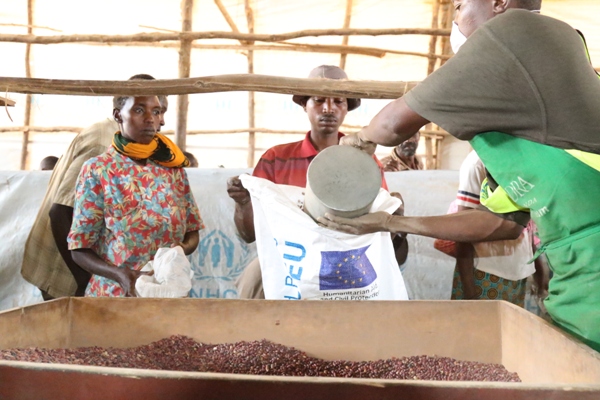
Kigali: The United Nations World Food Programme (WFP) in Rwanda welcomes €500 000 (US$ 600,000) in humanitarian funding from the European Union (EU) that will help meet the most pressing food needs of over 60,000 vulnerable Burundian refugees in eastern Rwanda.
“The European Union has been a steadfast donor to WFP over the years and their commitment to supporting refugees is admirable,” said Edith Heines, WFP Representative and Country Director in Rwanda.
“The value and importance of consistent funding cannot be stressed enough as it ensures we can meet the continued needs of refugees and for this we are very grateful to European taxpayers. We look forward to continuing our partnership with the EU to save and change lives in Rwanda.”
“While the displacement of Burundian refugees is a forgotten crisis, the European Union continues to show solidarity with displaced Burundians who fled conflict in their home country,” said Christos Stylianides, the EU Commissioner for Humanitarian Aid and Crisis Management.
“Our partnership with WFP in Rwanda is sustaining lives by providing food assistance to thousands of Burundian refugees at the Mahama refugee camp. Through our support of cash transfers for refugees, we are committed to help the people in need and preserve the dignity of those we reach through our humanitarian funding,” he added.
In 2018, €1.8 million (US$2 million) from the European Union helped WFP to continue providing full food rations and safeguard the food security of over 60,000 refugees. For the past years, the European Union has been contributing to helping vulnerable people at Mahama Refugee Camp, the newest and largest refugee camp in the country.
WFP relies on its strong partnership with the European Union. Thanks to humanitarian funding from the European Union, WFP continues to meet the food requirements of Burundian refugees through cash-based transfers and in-kind food assistance.
EU-funded actions also address the nutritional needs of children at the camp. WFP provides specialised nutritious foods for the treatment of moderate acute malnutrition in children under five years of age and to prevent malnutrition in children aged six months to two years.
With other stakeholders, including the United Nations and civil society partners, WFP is increasingly exploring opportunities for refugee integration and self-reliance through income-generating opportunities and other support for livelihoods.
Mahama refugee camp opened in April 2015 and is the most densely populated of Rwanda’s six refugee camps. It compares in size to Rwanda’s sixth largest city. Burundian refugees arrive almost daily at the camp, which has health centres, schools and a vibrant market place. (Fin)
